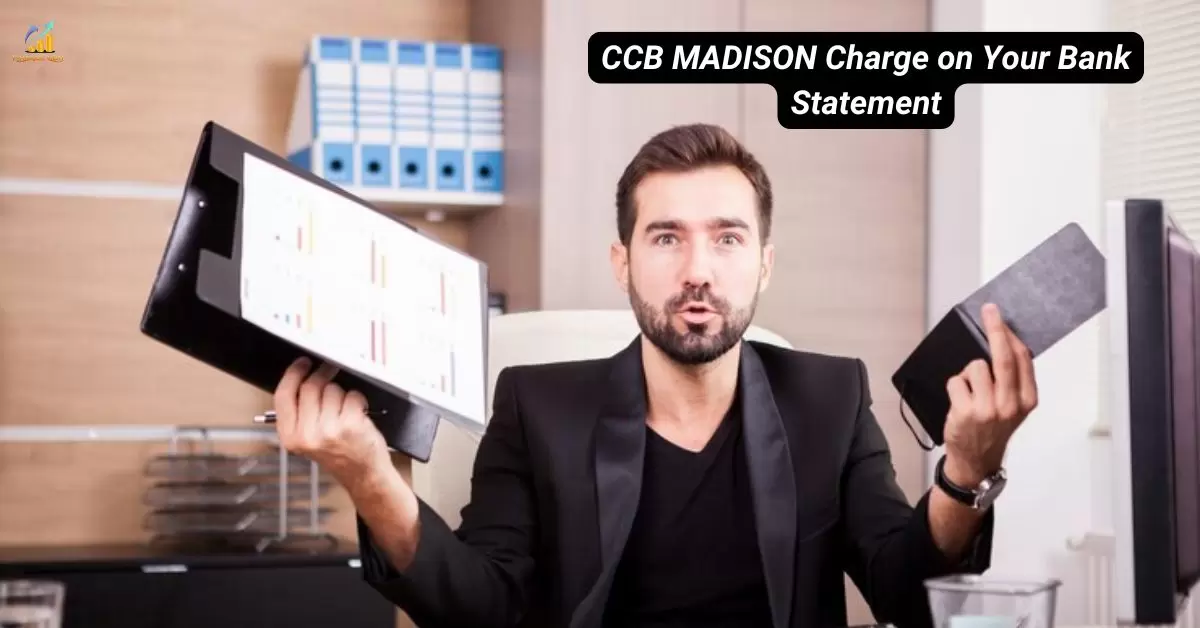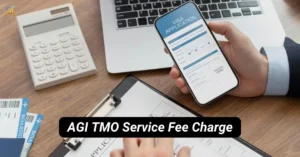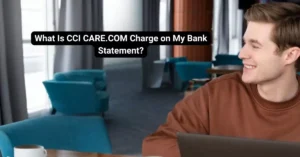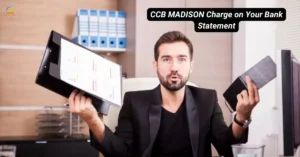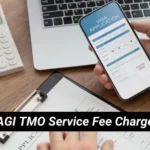Do you remember your last time looking at a bank statement? Did you see an unknown charge labeled “CCB MADISON” and your heart skipped a beat? If yes, then it’s not only you who experienced such scary or disturbing feelings.
These days, there are so many financial complications that can lead to unanticipated charges in one’s account; therefore even people who usually maintain calmness may go into panic if they do not know the reason behind such expenses. Don’t Worry! This article is aimed at shedding light on this issue and giving you peace of mind.
CCB Madison charges are extremely confusing but knowing them can help improve your financial management skills. This article on CCB Madison charges will take you into their world helping you manage your finances better. Whether you have been using credit cards for a long time or are just starting out, having this knowledge is very important for your financial well-being and calmness.
What Does CCB MADISON Stand For?

CCB MADISON isn’t some secret code or a hidden fee. It’s actually an acronym that stands for Credit Card Bank MADISON. These labels can often be found on Capital One credit card holders’ financial documents and are affiliated with the processing centre located in Madison, Wisconsin.
CCB MADISON on your statement simply means that Capital One has processed a transaction. It is not an independent organization nor is it a charge from another individual; this is how credit card purchases appear in one’s statement as identified by Capital One.
Breaking Down the CCB MADISON Charge
Now that we know what CCB MADISON means, let’s look at what kinds of transactions you might see under this label:
- Regular purchases: Your everyday spending at stores, restaurants, or online shops
- Cash advances: If you use your credit card to withdraw cash
- Balance transfers: When you move a balance from another card to your Capital One card
- Fees: Annual fees, late payment fees, or other charges related to your account
The amounts you see vary broadly from a couple of bucks to thousands for big ticket items. There is no set frequency on these charges since they will be reflected on the charges as long as you make use of your Capital One credit card.
Pro Tip: Keep a close eye on your spending habits by categorizing your CCB MADISON charges. This can help you budget more effectively and spot any unusual activity quickly.
Why You’re Seeing a CCB MADISON Charge

Understanding the mechanics behind CCB MADISON charges can demystify your bank statement. Here’s what’s happening behind the scenes:
- You make a purchase with your Capital One credit card.
- The merchant’s payment system communicates with Capital One’s processing center in Madison.
- Capital One verifies and approves the transaction.
- The charge is added to your account and appears on your statement as CCB MADISON.
The process takes place within seconds, resulting in transaction events that flow smoothly and in real-time. It is a routine practice for credit card companies when dealing with payments and should not be alarming by itself.
Is the CCB MADISON Charge Legitimate?
In most cases, yes—CCB MADISON charges are completely legitimate. However, it’s always wise to verify. Here’s a quick checklist to help you determine if a charge is normal:
- Does the amount match a recent purchase you made?
- Is the date of the charge consistent with when you used your card?
- Do you recognize the merchant associated with the charge?
In case you mark all those boxes, probably that is a genuine charge. But if something doesn’t align?
Red flags to watch for:
- Charges from merchants you don’t recognize
- Amounts that don’t match your purchases
- Multiple small charges in quick succession
If you see any of these symptoms, it is time for action to be taken. Don’t panic but act fast in order to keep yourself safe from anticipated fraud.
Read About: What is the WUVISAAFT Charge on Your Bank Statement? Explained Simply!
How to Track Your CCB MADISON Charges

Monitoring your CCB MADISON charges has become an easier task than ever due to the advancements in banking technology. To help you maintain a close oversight of your account, here are some suggestions:
- Online banking: Log in to your Capital One account to view real-time transaction updates.
- Mobile app: Download the Capital One app for on-the-go account monitoring.
- Text alerts: Set up SMS notifications for purchases over a certain amount.
- Email summaries: Opt for weekly or monthly transaction summaries sent to your inbox.
By using these tools, you can spot any unusual activity quickly and take action if needed.
Managing Your Capital One Account
Effective account management goes beyond just tracking charges. Here are some best practices to keep your finances in check:
- Review your statement regularly: Set aside time each month to go through your charges line by line.
- Understand your billing cycle: Knowing when your statement closes can help you plan payments and avoid interest.
- Keep receipts: Match them against your CCB MADISON charges for easy verification.
- Use account features: Take advantage of spending analysis tools offered by Capital One.
“The best way to predict your financial future is to create it.” – This rings especially true when it comes to managing your credit card accounts.
What If You Don’t Recognize a CCB MADISON Charge?

Despite your best efforts, you might occasionally come across a CCB MADISON charge you don’t recognize. Don’t panic—here’s what to do:
- Double-check your records: Sometimes, merchant names on statements differ from store names.
- Contact Capital One: Call the number on the back of your card to speak with customer service.
- File a dispute: If you’re certain the charge is fraudulent, initiate a dispute process.
Capital One’s customer service is typically responsive and helpful. They can often provide more details about a charge or guide you through the dispute process if necessary.
Disputing a Charge: Process and Timeframe
If you need to dispute a charge, here’s what you can expect:
| Step | Action | Timeframe |
| 1 | Contact Capital One | Immediately |
| 2 | File a formal dispute | Within 60 days of the statement date |
| 3 | Investigation begins | Usually within 30 days |
| 4 | Temporary credit issued | Often within 1-2 business days |
| 5 | Resolution | Typically within 90 days |
Remember, the Fair Credit Billing Act protects you from fraudulent charges, but it’s crucial to act promptly.
Protecting Your Account from Unauthorized Charges
Prevention is always better than cure. Here are some strategies to keep your Capital One account secure:
- Use strong, unique passwords: Avoid easily guessable information like birthdays or phone numbers.
- Enable two-factor authentication: This adds an extra layer of security to your account.
- Monitor your account regularly: The sooner you spot an issue, the easier it is to resolve.
- Be cautious with public Wi-Fi: Avoid accessing your financial accounts on unsecured networks.
- Keep your contact information updated: This ensures Capital One can reach you quickly if they detect suspicious activity.
Digital Wallet Safety Tips:
- Only add your card to trusted devices
- Use biometric authentication when available
- Never share your PIN or security codes
By implementing these measures, you significantly reduce the risk of unauthorized CCB MADISON charges appearing on your statement.
Read About: What Is ‘Int I Digital Charge’ on Your Bank Statement? Find Out Now!
FAQs About CCB MADISON Charges
Can I change how this appears on my statement?
Unfortunately, no. CCB MADISON is Capital One’s standard identifier for credit card transactions.
Will CCB MADISON charges affect my credit score?
Not directly. However, your overall credit utilization and payment history can impact your score.
Are there fees associated with CCB MADISON charges?
The charges themselves don’t incur fees, but your normal credit card fees and interest rates apply.
How far back can I dispute a CCB MADISON charge?
Typically, you have 60 days from the statement date to dispute a charge, but it’s best to act as soon as you notice an issue.
Can I set up automatic payments for my CCB MADISON charges?
Yes, Capital One offers autopay options to help you manage your account balance and avoid late fees.
Final Thoughts
Understanding CCB MADISON charges is an essential part of managing your Capital One credit card effectively. By staying informed and vigilant, you can enjoy the convenience of your credit card while maintaining control over your finances.
Remember these key points:
- CCB MADISON is Capital One’s identifier for credit card transactions
- Regular monitoring of your account is crucial
- Act quickly if you spot any suspicious activity
- Take advantage of Capital One’s security features and customer service
With these guidelines in hand, you will be better suited to deal with any CCB MADISON charges that may show up on your billing statement. Knowledge is the first step towards financial security and now you understand how to manage your account firmly.
Don’t let unexpected charges throw you off balance. Stay informed, stay alert, and take charge of your financial future. Your bank statement doesn’t have to be a source of stress—it can be a powerful tool for financial management when you know what to look for.
Now, go ahead and review your latest statement. Armed with this new knowledge, you’ll find that those CCB MADISON charges are no longer a mystery but a clear record of your financial activity. Here’s to smart spending and peace of mind!

I am a professional finance blogger who simplifies complex financial topics, offering practical advice on personal finance and market trends. My blog helps readers make informed financial decisions with clear, accurate insights.
